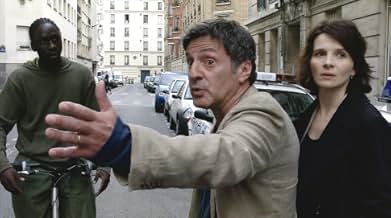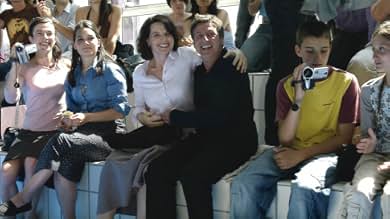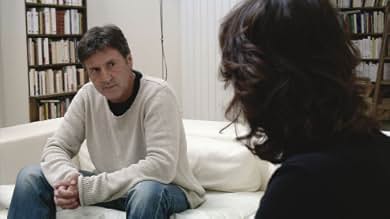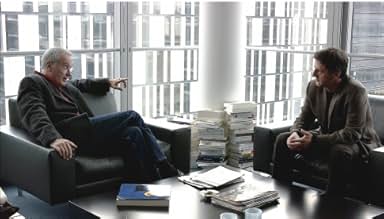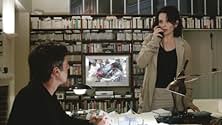Caché
- 2005
- Tous publics
- 1h 57m
A married couple is terrorized by a series of surveillance videotapes left on their front porch.A married couple is terrorized by a series of surveillance videotapes left on their front porch.A married couple is terrorized by a series of surveillance videotapes left on their front porch.
- Awards
- 29 wins & 37 nominations total
- Director
- Writer
- All cast & crew
- Production, box office & more at IMDbPro
Featured reviews
"Caché (Hidden)" uses the visual power of film to create an escalating examination of contemporary paranoia and personal global responsibility the way Francis Ford Coppola's 1974 film "The Conversation" did with sound and fictional criminals.
Writer/director Michael Haneke plays visual tricks on the audience as voyeurs from the opening shot, much as he did with "Code Inconnu," as he coyly plays with technology, building on the pervasive surveillance potential of our times.
The comfortable upper middle class life of married intellectuals Daniel Auteuil and Juliette Binoche is more and more disrupted by spooky video and drawings from some kind of stalker. With a bit heavy-handed constant background TV news coverage about terrorism and other violence in the MidEast, as well as too much irony that Auteuil works on TV (evidently in yet another book discussion show like the central narcissist in "Look At Me (Comme une image)"), race is quickly introduced as a flash point in contemporary Paris from a brief street confrontation and reinforced with Auteuil's flashback dreams of his youth.
While the political angles are obvious, the Hitchcockian tension is very effectively built up (though not narratively resolved even as some secrets are revealed that lead to other inscrutabilities), not just as we see Auteuil repeatedly lie and Binoche practically disintegrate from nerves, but through sudden violence.
While we never understand who all is lying and who isn't, the film further plays on the truth that visual images don't in fact communicate the reality of a situation and can be misleading about relationships, particularly once paranoia has destroyed trust. The film also raises the question if people change their behavior if they know they are being watched and that you can't really hide from your past. Cynically, but perhaps honestly as opposed to in "Crash," here there is no easy resolution of acceptance of guilt and responsibility in personal lives any more than there is in the legacy of colonialism and racism.
Not only is the past never dead, but the film keeps repeating issues of not just am I my brother's keeper, but the sins of the father are revisited on the sons, such that it's important to keep watching even as the credits start to appear at the end (there was much shouting when some folks got up to leave too soon, blocking cryptic clues to those behind them).
The subtitles are very poorly done, with many scenes having them white on white, instead of the much easier to read yellow.
Writer/director Michael Haneke plays visual tricks on the audience as voyeurs from the opening shot, much as he did with "Code Inconnu," as he coyly plays with technology, building on the pervasive surveillance potential of our times.
The comfortable upper middle class life of married intellectuals Daniel Auteuil and Juliette Binoche is more and more disrupted by spooky video and drawings from some kind of stalker. With a bit heavy-handed constant background TV news coverage about terrorism and other violence in the MidEast, as well as too much irony that Auteuil works on TV (evidently in yet another book discussion show like the central narcissist in "Look At Me (Comme une image)"), race is quickly introduced as a flash point in contemporary Paris from a brief street confrontation and reinforced with Auteuil's flashback dreams of his youth.
While the political angles are obvious, the Hitchcockian tension is very effectively built up (though not narratively resolved even as some secrets are revealed that lead to other inscrutabilities), not just as we see Auteuil repeatedly lie and Binoche practically disintegrate from nerves, but through sudden violence.
While we never understand who all is lying and who isn't, the film further plays on the truth that visual images don't in fact communicate the reality of a situation and can be misleading about relationships, particularly once paranoia has destroyed trust. The film also raises the question if people change their behavior if they know they are being watched and that you can't really hide from your past. Cynically, but perhaps honestly as opposed to in "Crash," here there is no easy resolution of acceptance of guilt and responsibility in personal lives any more than there is in the legacy of colonialism and racism.
Not only is the past never dead, but the film keeps repeating issues of not just am I my brother's keeper, but the sins of the father are revisited on the sons, such that it's important to keep watching even as the credits start to appear at the end (there was much shouting when some folks got up to leave too soon, blocking cryptic clues to those behind them).
The subtitles are very poorly done, with many scenes having them white on white, instead of the much easier to read yellow.
If you've just seen "Cachê" and are still (understandably) in shock, not knowing whether you really liked it or not, let me ask you a few questions. Now, when was the last time a film:
a) had you glued to your seat as in "Caché", your eyes and neurones required to work in full gear from beginning to end, making it impossible to erase it out of your mind (instead of the instantly forgettable films you see every week), and actually making a second viewing almost compulsory?
b) posed such complex, multi-layered questions -- socio-political ones (the shameful, violent legacy of past and present imperialist nations, the manipulation of "reality" by the State and the media), existential ones (the racial, class and social prejudices that we all carry and have to fight within ourselves), and more prosaic ones, like trying to solve a complicated thriller? When were they so masterly interwoven?
c) made you aware that your explanation for the movie's most immediate, "practical" question (who's sending the tapes to Georges) will be influenced by your own background and prejudices?
d) had such a controversial and rich ending? (I could think of at least five possible denouements, even considering that I DID see the two boys -- q.v. the multiple theories about the ending in "Caché"'s message boards here in IMDb).
"Caché" is one of the few real masterpieces of the 2000s. The mix of socio-political comment with the thriller genre is not new, of course (you can go back at least to great German silent films by Lang, Murnau, Dieterle, Pabst). In 2005 alone, Cronenberg made the half-successful "A History of Violence", Spielberg the underachieved "Munich", Stephen Gaghan the overwrought "Syriana", Paul Haggis the soap-operatic "Crash". But Haneke asks us and gives us much more: he demands our ability to fill in the many important historical and political gaps, messes with our prejudices but respects our intelligence, and knows that a good part of us viewers are bored to death of being spoon-fed with one-digit I.Q. plots in mechanical thrillers inhabited by tired, phony "archetypes" of good x evil characters.
"Caché" is a monumental proof of Haneke's COMPLETE command of his craft. Artistic achievements like this are now SO rare in films that "Caché" feels like a happening -- a work of art that is mind-boggling, hypnotic and physically unnerving, ethically and esthetically disturbing, combining the sense of revelation and discomfort you get with the best political films with the braincells workout you get with the best thrillers.
As I left the theater, three masterpieces immediately came to my mind: Clouzot's "Le Corbeau" (a political statement disguised as a thriller and a probable inspiration for "Caché"), Antonioni's "The Passenger" (ditto, and also for the long, breathtaking, "open-meaning" last shot) and Resnais' "Marienbad" (the seminal film of multi-layered possible interpretations of "reality"). "Caché" stands tall on its own, reaffirming Haneke as one the top-5 working directors of the 2000s. Can't wait for his next film -- but while I do, I'll watch "Caché" one more time, and understand that hiding (Georges hiding his past and his feelings, nations hiding shameful parts of their history, Haneke hiding evidence, explanations and conclusions) can be a form of powerful revelation...and self-revelation.
a) had you glued to your seat as in "Caché", your eyes and neurones required to work in full gear from beginning to end, making it impossible to erase it out of your mind (instead of the instantly forgettable films you see every week), and actually making a second viewing almost compulsory?
b) posed such complex, multi-layered questions -- socio-political ones (the shameful, violent legacy of past and present imperialist nations, the manipulation of "reality" by the State and the media), existential ones (the racial, class and social prejudices that we all carry and have to fight within ourselves), and more prosaic ones, like trying to solve a complicated thriller? When were they so masterly interwoven?
c) made you aware that your explanation for the movie's most immediate, "practical" question (who's sending the tapes to Georges) will be influenced by your own background and prejudices?
d) had such a controversial and rich ending? (I could think of at least five possible denouements, even considering that I DID see the two boys -- q.v. the multiple theories about the ending in "Caché"'s message boards here in IMDb).
"Caché" is one of the few real masterpieces of the 2000s. The mix of socio-political comment with the thriller genre is not new, of course (you can go back at least to great German silent films by Lang, Murnau, Dieterle, Pabst). In 2005 alone, Cronenberg made the half-successful "A History of Violence", Spielberg the underachieved "Munich", Stephen Gaghan the overwrought "Syriana", Paul Haggis the soap-operatic "Crash". But Haneke asks us and gives us much more: he demands our ability to fill in the many important historical and political gaps, messes with our prejudices but respects our intelligence, and knows that a good part of us viewers are bored to death of being spoon-fed with one-digit I.Q. plots in mechanical thrillers inhabited by tired, phony "archetypes" of good x evil characters.
"Caché" is a monumental proof of Haneke's COMPLETE command of his craft. Artistic achievements like this are now SO rare in films that "Caché" feels like a happening -- a work of art that is mind-boggling, hypnotic and physically unnerving, ethically and esthetically disturbing, combining the sense of revelation and discomfort you get with the best political films with the braincells workout you get with the best thrillers.
As I left the theater, three masterpieces immediately came to my mind: Clouzot's "Le Corbeau" (a political statement disguised as a thriller and a probable inspiration for "Caché"), Antonioni's "The Passenger" (ditto, and also for the long, breathtaking, "open-meaning" last shot) and Resnais' "Marienbad" (the seminal film of multi-layered possible interpretations of "reality"). "Caché" stands tall on its own, reaffirming Haneke as one the top-5 working directors of the 2000s. Can't wait for his next film -- but while I do, I'll watch "Caché" one more time, and understand that hiding (Georges hiding his past and his feelings, nations hiding shameful parts of their history, Haneke hiding evidence, explanations and conclusions) can be a form of powerful revelation...and self-revelation.
In Paris, Georges Laurent (Daniel Auteuil) is a famous host of a literary talk show on TV, who lives in a comfortable house with his wife Anne (Juliette Binoche) and their teenager son Pierrot (Lester Makedonsky). When Georges and Anne receives videotapes of surveillance of their private life and weird and gore childlike drawings, they go to the police, but they do not get any protection since there is not a clear menace to the Laurent family. When Georges follows a clue in one of the tapes that shows his childhood home, he meets his former adopted brother, the Algerian Majid (Maurice Bénichou) and accuses him of sending the tapes. Meanwhile, through glimpses of Georges' nightmares, his lies due to his jealous relationship with his foster brother are disclosed.
"Caché" is definitely an inconclusive movie, open to the most different interpretations, and this obvious based on the number of very intelligent and helpful discussions in IMDb Message Board. I am a fan of Michael Haneke, and I believe this is his intention, to promote a wide discussion about his movie at the same time he uses the historical moment in 1961 of the war between France and Alger. The last scene with Majid's son at Pierrot's school indicating that the may know each other just increases the possibilities. Anyway, the tense and realistic story of guilty and paranoia is very original and without the usual clichés of Hollywood movies. My vote is seven.
Title (Brazil): "Caché"
"Caché" is definitely an inconclusive movie, open to the most different interpretations, and this obvious based on the number of very intelligent and helpful discussions in IMDb Message Board. I am a fan of Michael Haneke, and I believe this is his intention, to promote a wide discussion about his movie at the same time he uses the historical moment in 1961 of the war between France and Alger. The last scene with Majid's son at Pierrot's school indicating that the may know each other just increases the possibilities. Anyway, the tense and realistic story of guilty and paranoia is very original and without the usual clichés of Hollywood movies. My vote is seven.
Title (Brazil): "Caché"
A conventional psychological thriller, a social polemic, or a serious work of art. To fully realise even one of these is an achievement, but to realise all three in a single piece of cinema is remarkable indeed.
On the most obvious level, Hidden is a thriller which, in traditional European fashion, gets under your skin in spite of long shots when nothing happens (nevertheless, it is not for the squeamish). Also in typical European fashion, it requires a little more concentration and attention span than the average Hollywood offering to interpret and understand.
George (Daniel Auteuil) and Anne (Juliette Binoche) are a typical well-to-do Parisienne family. George is a TV chat show host for a literary discussion programme, his wife and young adolescent son are normal and easy to identify with. The acting is such that we see them as real people, almost as if in a documentary.
The couple are watching a video. We don't realise this at first. It's simply a video of the outside of their house, nothing more. Then the tell-tale lines on the screen appear as the video is rewound and the camera pans back. There is nothing threatening about the video except that they do not know who took it - it was just delivered on the doorstep. The exact point from which the video was shot is hard to ascertain.
Further videos arrive - still nothing threatening (the police refuse to do anything), but we can not only sense the couple's mounting panic, we are part of it. Nothing in Haneke's film so far justifies the sense of horror which we share with George and Anne but it is intense and very real. George tries to make connections from the clues so far. He feels extremely threatened. He accuses someone from his childhood. The accused is convincing in his protestations of innocence. In this climate of fear and reprisal things can only get worse.
On a second level, Hidden can be taken as both social comment on the tensions between bourgeois France and the ethnic Algerians that inhabit the poorer areas. France is unable to accept or own up to its guilt in its historic treatment of these large minorities, either in the past or the present. As a dynamic that is almost microcosmic, it reaches out to a wider world of have and have-nots, where those with power refuse to acknowledge faults because there is no-one to make them say sorry. This is conveyed in the film first from the typical settings, from wealthy modern areas to more pitiful suburbs, subtle overlays with background TV programs mentioning Iraq (British involvement, of course, not French), and the symbolic way the characters are presented enabling them to be easily transposed to analogous settings. It is a stark condemnation of how those with power (but also with suppressed guilt and a trigger-happy tendency to make accusations) cause much more damage than is necessary because of such shortcomings.
On the third level, as a work of art, Hidden is much more insidious. Director Haneke uses the camera as a tool between him and the audience in such a way that it is impossible to remain a passive, almost hidden viewer. The type of audience that the film will appeal to (educated, probably affluent) is also the one that will be most unsettled. Haneke is doing much more than telling a story - he is using the power of images to interact with his audience in a way that they are not fully aware of (until later analysis).
Then there is the question of who shot the tapes. If you really enjoyed the film but struggle with the answer (which is turns out to be different depending on whether you view it as a psychological thriller or as a polemic/work-of-art), you can go to the official website (which saves me revealing it!) - at which point you will probably want to watch it again to see the details you missed from inattention.
Hidden is a remarkably accomplished work. It is difficult to watch any scene and think of Binoche as Binoche (or Auteuil as Auteuil) rather than the character being played. In terms of directorial technique it will no doubt be an inspiration to film-makers for years to come. In terms of films that can alter the way we view the world it is first class - all the more so for the fact that its message is indirect (or hidden) rather than displayed ostentatiously and openly. Working out the superficial answer to the puzzle is all the more satisfying after piecing the clues together yourself. Working out the deeper sense, persuades by allowing the viewer to come to an undeniable realisation. Are ytou still paying attention? Don't fall asleep in this movie . . .
On the most obvious level, Hidden is a thriller which, in traditional European fashion, gets under your skin in spite of long shots when nothing happens (nevertheless, it is not for the squeamish). Also in typical European fashion, it requires a little more concentration and attention span than the average Hollywood offering to interpret and understand.
George (Daniel Auteuil) and Anne (Juliette Binoche) are a typical well-to-do Parisienne family. George is a TV chat show host for a literary discussion programme, his wife and young adolescent son are normal and easy to identify with. The acting is such that we see them as real people, almost as if in a documentary.
The couple are watching a video. We don't realise this at first. It's simply a video of the outside of their house, nothing more. Then the tell-tale lines on the screen appear as the video is rewound and the camera pans back. There is nothing threatening about the video except that they do not know who took it - it was just delivered on the doorstep. The exact point from which the video was shot is hard to ascertain.
Further videos arrive - still nothing threatening (the police refuse to do anything), but we can not only sense the couple's mounting panic, we are part of it. Nothing in Haneke's film so far justifies the sense of horror which we share with George and Anne but it is intense and very real. George tries to make connections from the clues so far. He feels extremely threatened. He accuses someone from his childhood. The accused is convincing in his protestations of innocence. In this climate of fear and reprisal things can only get worse.
On a second level, Hidden can be taken as both social comment on the tensions between bourgeois France and the ethnic Algerians that inhabit the poorer areas. France is unable to accept or own up to its guilt in its historic treatment of these large minorities, either in the past or the present. As a dynamic that is almost microcosmic, it reaches out to a wider world of have and have-nots, where those with power refuse to acknowledge faults because there is no-one to make them say sorry. This is conveyed in the film first from the typical settings, from wealthy modern areas to more pitiful suburbs, subtle overlays with background TV programs mentioning Iraq (British involvement, of course, not French), and the symbolic way the characters are presented enabling them to be easily transposed to analogous settings. It is a stark condemnation of how those with power (but also with suppressed guilt and a trigger-happy tendency to make accusations) cause much more damage than is necessary because of such shortcomings.
On the third level, as a work of art, Hidden is much more insidious. Director Haneke uses the camera as a tool between him and the audience in such a way that it is impossible to remain a passive, almost hidden viewer. The type of audience that the film will appeal to (educated, probably affluent) is also the one that will be most unsettled. Haneke is doing much more than telling a story - he is using the power of images to interact with his audience in a way that they are not fully aware of (until later analysis).
Then there is the question of who shot the tapes. If you really enjoyed the film but struggle with the answer (which is turns out to be different depending on whether you view it as a psychological thriller or as a polemic/work-of-art), you can go to the official website (which saves me revealing it!) - at which point you will probably want to watch it again to see the details you missed from inattention.
Hidden is a remarkably accomplished work. It is difficult to watch any scene and think of Binoche as Binoche (or Auteuil as Auteuil) rather than the character being played. In terms of directorial technique it will no doubt be an inspiration to film-makers for years to come. In terms of films that can alter the way we view the world it is first class - all the more so for the fact that its message is indirect (or hidden) rather than displayed ostentatiously and openly. Working out the superficial answer to the puzzle is all the more satisfying after piecing the clues together yourself. Working out the deeper sense, persuades by allowing the viewer to come to an undeniable realisation. Are ytou still paying attention? Don't fall asleep in this movie . . .
This was a very good film, an excellent study in psychological tension. Unfortunately, I don't think a lot of Americans or really anyone who isn't very familiar with the French-Algerian war will be able to understand it. It's about the horrors of that war and the French denial of their part in it -- very much tying in to the French youth race riots we saw last year. It also quietly draws some parallels with the war in Iraq. The ending was perhaps much too subtle. Everyone around me as we left the theater here in Los Angeles was expressing confusion. This was an older, more sophisticated audience, too. I don't think they really understood what was happening all along.
That said, it was still fantastic. I'm glad that at least outside of the U.S. it's gotten the recognition it deserves.
That said, it was still fantastic. I'm glad that at least outside of the U.S. it's gotten the recognition it deserves.
Did you know
- TriviaThere is no music, save for the theme on George's show, and background music at Anne's publishing party.
- GoofsDuring the tape where Georges pulls up in his car and parks at night the headlights clearly cast a huge distinct shadow of the camera on the wall.
- Quotes
Georges Laurent: Isn't it lonely, if you can't go out?
Georges's Mom: Why? Are you less lonely because you can sit in the garden? Do you feel less lonely in the metro than at home? Well then! Anyway, I have my family friend... with remote control. Whenever they annoy me, I just shut them up.
- Crazy creditsThe opening credits appear over a shot of the husband and wife's house, but they appear one by one and in rows. By the time the credits are over they are all shown together, much like they would on a poster or in the credits section of a movie trailer.
- ConnectionsFeatured in Smagsdommerne: Episode #3.13 (2006)
- How long is Caché?Powered by Alexa
Details
- Release date
- Countries of origin
- Official site
- Language
- Also known as
- Caché (Hidden)
- Filming locations
- 49 Rue Brillat-Savarin, Paris 13, Paris, France(Georges' house)
- Production companies
- See more company credits at IMDbPro
Box office
- Budget
- €8,000,000 (estimated)
- Gross US & Canada
- $3,647,381
- Opening weekend US & Canada
- $57,010
- Dec 25, 2005
- Gross worldwide
- $16,197,824
- Runtime1 hour 57 minutes
- Color
- Sound mix
- Aspect ratio
- 1.78 : 1
Contribute to this page
Suggest an edit or add missing content

